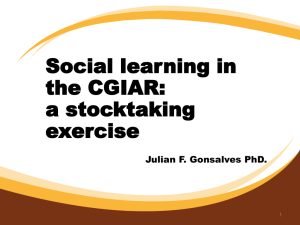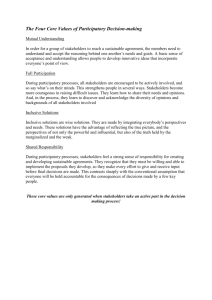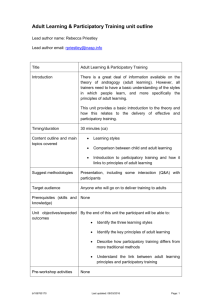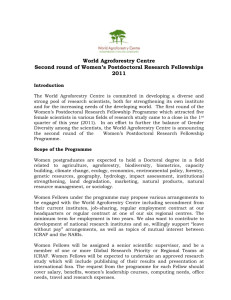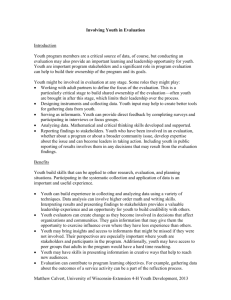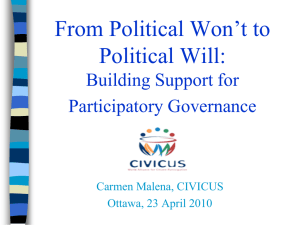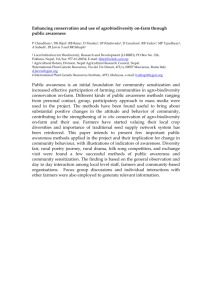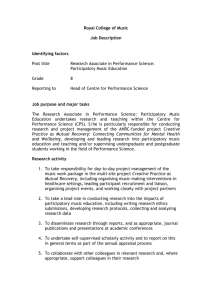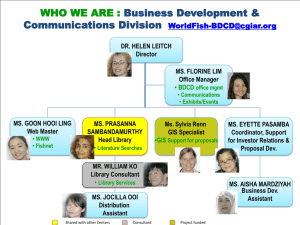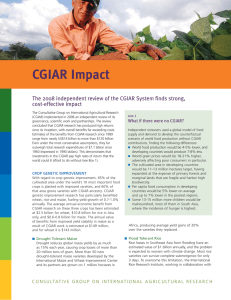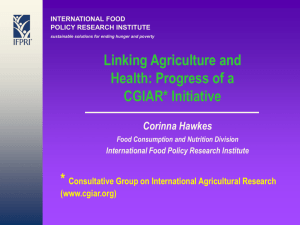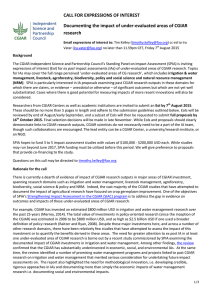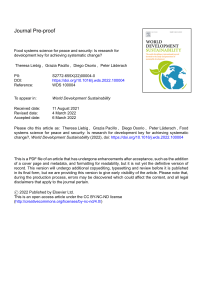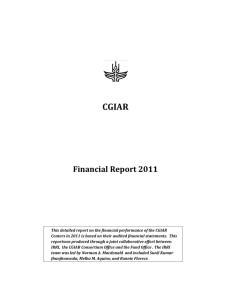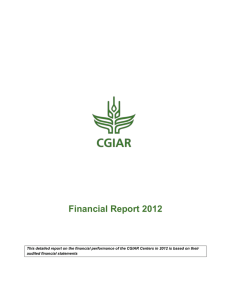Social learning in the CGIAR: Highlights of a stocktaking exercise
advertisement
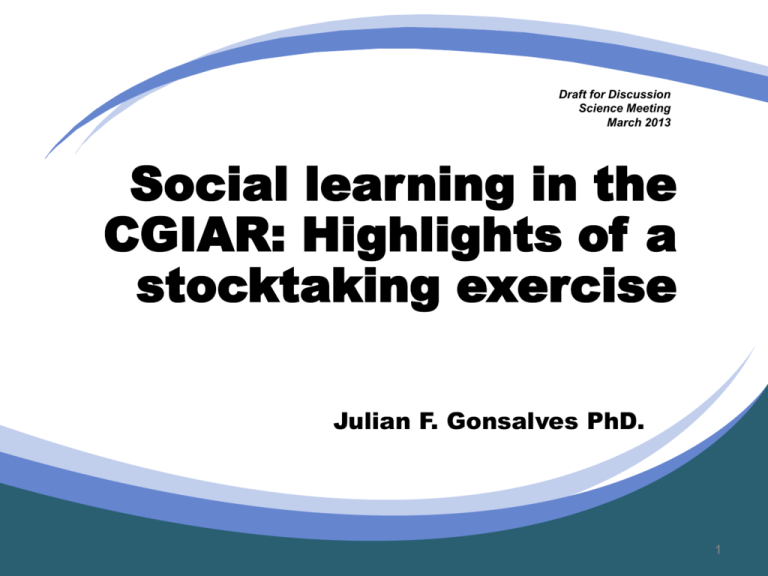
Draft for Discussion Science Meeting March 2013 Social learning in the CGIAR: Highlights of a stocktaking exercise Julian F. Gonsalves PhD. 1 Scope • Innovative social learning related efforts in the CGIAR • Lessons we have learned along the way (the past should inform the future) • Ensure no duplication with other CCAFS studies on communications, social differentiation 2 Activity Duration • 25 days in November-December 2012 for stocktaking • 10 days in January-February 2013 for preparation of working paper and revised powerpoint presentation 3 Process in a Nutshell • Review of secondary literature, websites and extensive personal correspondence • Center-specific review limited to website-research and survey respondent inputs • Compilation of Illustrative Cases (128) • Conduct of surveys ( one-to-one) and analysis respondents (47) and personal correspondence (33) • Preparation of powerpoint presentation, promising cases collection and working paper 4 PART 1 Reform in CGIAR: Addressing Development Challenges More Directly 5 6 7 8 9 CGIAR consortium CEO on Partnerships • While there are no doubt many excellent partnerships in the system, as a whole we need to improve massively on this front; • We need to share both budgets and program responsibility more generously with our partners, both upstream and downstream. • …Aligning our internal research priorities with those of the countries and regions we serve is both a need and an opportunity • Now that our budgets are growing we need to become less defensive and more open as a system, learning from the good examples we do have. • We also need to become much more outward facing – now that we have made very good progress on working better among the Centers, we also need to work better with partners. (from Frank Rijsberman reflections on GCARD, Nov 5th) 10 What the survey respondents said? With the new approach to transforming AR4D, do we also have a more conducive environment in the CGIAR for Social Learning Approaches? 11 The CGIAR might now does have a more conducive climate for Social Learning (SL). 12 • Improved collaboration, cooperation and communication “ We are seeing better collaboration and cooperation among centers than had been the norm over my long full time involvement with the CGIAR---so I’m cautiously optimistic about improved uptake of such approaches. I think the relevance certainly remains as high as ever”. - Carol J. Pierce Colfer (2.9) 13 Improved work arrangements • Better collaboration across centers (via CRPs than in the past • More emphasis on a systems approach that includes interdisciplinary approaches • A move towards negotiating shared realities of problems and solutions • Research that ‘goes beyond’ biophysical and economic components 14 A greater emphasis on outcomes, theories of change and impact pathways • A clear push for showing research outcomes • More recently a call for intermediate development outcomes • The focus on outcome makes participatory approaches more relevant 15 CRPs and donor emphasis on impact create “pressure” for partnerships • The changes were often the result of donor pressures. • Will the donor pressures to bridge the R&D gaps remain? 16 Acknowledging diversity, complexity and multiple-scales • We increasingly focus on more complex challenges characterized by multiple stakeholders with often divergent perspectives and competing goals (2.6) • Awareness of the diversity and complexities of the challenges. These complex problems need knowledge intensive approaches, does not allow for a “one size fits all” approach not embedded in easy to disseminate and adopt technologies 17 • "There are many implementing groups, facilitators, and communities of practice experts as there are methods“ • We need to recognize that the diversity as it meets different needs of researchers. Researchers might become engaged in social learning for different reasons. We need to grant that this accounts for the range of approaches. 18 Challenges remain: • Still a prevailing concern about integrating R&D: “Somewhere on the continuum between R and D lies the current reality” i.e. a Gap • How can we build processes that integrate both research and development from the outset, around common issue rather than holing one on the other opportunistically (Mark Lundy) 19 Challenges remain (contd.): • • • • • • Limited communication between scientist and partners on the Solutions sought in a “linear” manner Cumbersome working modalities of CRPs Difficult coordination of CRPs Communication limited mainly to institutional focal points How serious is the commitment to development outcomes (big change in mindset for some) • Recognition of SL/PM is limited within scientific research community (struggle for SL proponents to be recognized) • Mechanisms to link CRPs (focused on global public goods) to national partners are lacking 20 Challenges remain (contd.): • The Consortium is working on a new concept of management for results with concrete and measurable outcomes for the assessment of the CRP activities. Is there a risk of result orientation leading back to old productivity and breeding orientation of CG? • What do we do when we know that social learning and institutional work does show “direct” impacts? 21 Challenges remain (contd.): • CGIAR scientists are now swamped with design and coordination of CRPs, and seem to be working pretty independently in this – making it, again, difficult "coordinating" among these differing, if all valuable, implementation methods (2.3) 22 Yet we are hopeful: • The goal is to work for a CGIAR better able to reach the billion left behind by the Green Revolution through the broader use of such approaches. (2.14) 23 • Relevance of research will improved greatly if CRP and CG scientists spend quality time with the target groups, talk less, listen more and create enabling environment so that farmers can make self directed decision making. Before that they need to question themselves “whose lives we would like to change?” and once they are crystal clear on that success is not far behind. (1.9) 24 Addressing climate change, whether mitigation or adaptation, is going to require changes in people’s behaviour. Suggesting or mandating change from on high has long proven fraught with difficulties and fatal errors. The human variability (along with the environmental variability) globally means we simply cannot decide what the answer is and apply across the board. That doesn’t work. We really need to be tailoring both mitigation and adaptation efforts to local contexts, and that will necessitate the help of local people – a shared learning approach that analyzes, plans, mitigates/adapts, monitors what happens, and improves on initial results, in an iterative manner. - Carol Colfer 25 PART 2 Social Learning in Support of CCAF’s Theme 4 Objectives 26 Social Learning: What definitions work for us? 27 • The IDS/IIED study states that “Social Learning approaches help facilitate knowledge sharing and joint learning experiences between stakeholders… through working together to better understand their situation, new shared ways of knowing are generated”. 28 • Keen (2005) defines “Social Learning as the collective action and reflection that takes place amongst both individuals and groups when they work to improve the management of the inter relationships between social and ecological systems…”. 29 A different terminology • Steve Waddel preferred not to use Social Learning when he described large-system change processes. “When formalised into new patterns of working together – often through the creation of new umbrella organisations with participants from diverse parts of society – these mutually beneficial outcomes represent societal learning”. 30 • “Societal learning is a process of changing patterns of interactions within and between adverse organisations and social units to enhance society’s capacity to innovate. Large scale problems – such as poverty and environmental degradation – require substantial societal learning in order for lasting change to occur”. Steve Waddel (http://www.pegasuscom.com/bigsyschange.html) 31 A social learning definition that relates to CGIAR work? • Social learning is defined as the process through which groups of people learn, by jointly defining problems, searching for and implementing solutions, and assessing the value of solutions for specific problems (Koelen and Das, 2002). • Social learning brings about a shift from ‘‘multiple cognition” to ‘‘collective cognition”. Individuals involved in social learning processes begin with quite different perceptions of their current situation and the potential for change; as they interact, they develop common, shared perspectives, insights and values. Source: Personal exchanges ( Andre Devaux, Nov 9th 2012) 32 In a AR4D framework, a research related interventions are needed in at least three levels: • INDIVIDUAL FARMER LEVEL: Farmer engagement in diagnosis (PRA typed) or in evaluating technologies, to more complex participatory breeding programs • COMMUNITY LEVEL: Community-based biodiversity management, adaptive co -management, comanagement, etc. • MULTISCALE LEVEL: Innovation platforms, learning alliances, multi-stakeholder platforms, etc. 33 • At whatever scale we work a learning framework should apply... Need for learning framework 34 Synthesis: Fostering cycles of learning is crucial • Stakeholder participation processes will (help) introduce perspectives and insights that researchers would not otherwise. The challenge is how do we synthesise the knowledge that we acquire from stakeholder networks and feed this into the action process. (1.4) 35 Methodological diversity • What the stocktaking exercise came up with 36 • Even if in isolated pockets - not coordinated or mainstreamed into programs – there is rich array of field tested social learning related approaches within the CG system 37 • Check out the cases recommended by respondents in this survey 38 BUILDING ON CG EXPERIENCES TO SHAPE SL APPROACHES FOR CCAFS CLIMATE CHANGE RESEARCH Participatory Plant Breeding, and Participatory Varietal Selection, Community Biodiversity Management Participatory Market Chain Analysis/Value Participatory Communications (ICT, participatory video, etc.) Multi stakeholder dialogue platforms Decision-based approaches eg. Adaptation PathwaysWorldFish Social Learning for Climate Change Research Innovation Platforms Farmer Field Schools/ CIALS Gender analysis/ Gender differentiation Learning Alliances J.F. Gonsalves 2012 Adaptive Collaborative Management, CBM, and Co-Management and Conflict Resolution Mechanisms 39 • We should celebrate this diversity in social learning related approaches in the CGIAR 40 • Recognize that communities and individuals are already adapting and coping with climate variability and associated change • Recognize that scientists will use different entry points for bringing in SL perspective • Participatory assessments have to be deepened (e.g. superficial vulnerability assessments won’t help) to understand how communities cope with adversity 41 • What about the question of different scales (local national?) 42 • “Addressing climate change, whether mitigation or adaptation, is going to require changes in people’s behaviour. We really need to be tailoring both mitigation and adaptation efforts to local contexts, …with the help of local people – a shared learning approach that analyzes, plans, mitigates/ adapts, monitors what happens, and improves on initial results”. - Carol J. Pierce Colfer 43 Relevance of local scale engagement in climate change work We have to deal with location specificities: • Agro-ecological, climatic, culture, etc. • Climate change scenarios must get close to reality and on the other challenge in bringing locally derived solutions to scale 44 Important considerations in strengthening local-level action • Capacities of local level institutions need to be built • Strengthening capacities to innovate is just as important as technological solutions • Farmer-to-farmer linkages are a critical factor for horizontal communication ultimately influencing outscaling 45 • There has been extensive past work on community-level learning approaches: Farmer Field Schools, CIALS, Adaptive Co-Management remain relevant as “tools” for enhancing learning, fostering cooperation and as mechanisms for lower-level outscaling 46 • But working at the local level alone wont suffice: vertical upscaling approaches are needed • Social learning is essential at these different levels 47 Going to scale is always the challenge (the need for research on partnership processes) • We need platforms and networks which encourage learning about methods as well. We need to have more action research on partnerships and how methods actually play out with feedback loops to learning. Mechanistic blue prints won’t work… This is always the challenge as we go to scale. (2.10) 48 Partnerships and associated platforms offer possible solution Source: Working with National Innovation Pilot Learning Sites and Inter-regional Innovation Platforms -Sub-Saharan 49 Africa Challenge Program by Wale Adekunle A critical role for participatory communications • Indeed, one of the challenges I see is how to integrate participatory communications into scaling up strategies that are both effective and sustainable. All of this is deeply embedded in social learning theory and practice. - Kevin Kamp 50 Towards an Enabling Environment for Social Learning (Survey Results) 51 What does the CGIAR have to do to support and help such approaches (Social Learning related approaches) Social Learning process should allow for the incorporation of lessons from the past- the challenges to not re-invent the wheel and learn from past experiences – Personal correspondence: Simone Staiger, Nov. 2012 52 Emphasis on the importance of institutional culture that: • Recognizes social science as having its own legitimacy (“not a hand maiden of biophysical sciences) • Values collaboration and understanding of philosophical differences • Has a commitment to learn from previously demonstrated work • Understand the need for more experienced social scientist: “We are good at bringing in young researchers and students…” 53 • Change will happen if there are a few “champions” • Need for a critical mass of like minded professionals in every organisation • Also need for a balanced composition of interdisciplinary research team members (return of former CG staff to the fold) • Diversity implies more representation of southern researchers more especially so if social learning is our focus 54 • “We need partners from the countries in the south who have a more detailed understanding on context. If capacity is a constraint we should build that... it strengthens our capacity to understand a place...“ - Ruth Meinzen Dick 55 Question: Will the way result management is implemented discourage participation? • What results are valued? What about development outcomes? • Social learning is difficult to track after all • Will the recent emphasis on intermediate development outcomes provide new windows of opportunity? 56 • The incentives structure must be in place. The requirement to deliver outcomes in term of development is a key step. • Senior management have a key role in fostering a new environment for change in emphasis, approaches and commitment to development outcomes. • Scientific publications must be considered as only one contribution to agricultural knowledge for development. Other knowledge products and its effects must be compensated. (2.5) 57 Respondents were fairly upbeat about new prospects for social learning methods • They felt that Senior Management center support is warranted • Incentive, recognition and reward mechanisms need to be more explicitly assured • New work-modalities and focus on outcomes have made a difference 58 • "Top priority that all of us can work on is to put in place a system of managing and monitoring CRP performance against agreed and prioritized development outcomes, reported in a timely and harmonized fashion. This is in essence what the SRF Action Plan lays out and this is now widely endorsed and the top priority for implementation in 2013. (From Frank Rijsberman reflections on GCARD, Nov 5th) 59 Is the research community ready to respond to these challenges? In general, the 47 respondents and 33 correspondents were optimistic about the prospects for change. 60
